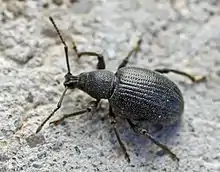Otiorhynchus meridionalis
Otiorhynchus meridionalis, the lilac root weevil, is a species of broad-nosed weevil in the family Curculionidae.[1][2][3][4] It is found in North America.[1] Lilac root wevils are shiny, brownish-black beetles, about 0.25 inches (0.6 cm) with long snout (rostrum) and geniculate (elbowed) antennae. They are common landscape pests, feeding on lilac, euonymous and peonies.[5]

| Otiorhynchus meridionalis | |
|---|---|
 | |
| Scientific classification | |
| Domain: | Eukaryota |
| Kingdom: | Animalia |
| Phylum: | Arthropoda |
| Class: | Insecta |
| Order: | Coleoptera |
| Infraorder: | Cucujiformia |
| Family: | Curculionidae |
| Genus: | Otiorhynchus |
| Species: | O. meridionalis |
| Binomial name | |
| Otiorhynchus meridionalis Gyllenhal, 1834 | |
| Synonyms[1] | |
| |
Larvae feed on plant roots, while adult insects feed on leaves, eating only the edges in form of numerous U-shaped notches. They are commonly present on North American lilac, but seldom create lasting damage to the plant.[6][5]
Adult insects are nocturnal. Like other root weevils (O. ovatus, O. rugostriatus and O. sulcatus), they often wander into households during hot summer months in search for shade and moisture. Although harmless to humans, pets and furnishings, they pose a nuisance. Treatment with pyrethroid-based insecticides is recommended only in cases of severe infestations, and occasional bug is best tolerated or removed mechanically.[5]
References
- "Otiorhynchus meridionalis Report". Integrated Taxonomic Information System. Retrieved 2018-03-14.
- "Otiorhynchus meridionalis species details". Catalogue of Life. Retrieved 2018-03-14.
- "Otiorhynchus meridionalis Overview". Encyclopedia of Life. Retrieved 2018-03-14.
- "Otiorhynchus meridionalis Species Information". BugGuide.net. Retrieved 2018-03-14.
- Cranshaw, W. S. "Root Weevils – 5.551". CSU Extension. Colorado State University. Retrieved 2018-05-31.
- "Lilac (Syringa)-Root weevil". Pacific Northwest Handbooks. University of Oregon. 11 April 2017. Retrieved 2018-05-31.
Further reading
- Alonso-Zarazaga, Miguel A.; Lyal, Christopher H.C. (1999). A World Catalogue of Families and Genera of Curculionoidea (Insecta: Coleoptera) (Excepting Scotylidae and Platypodidae). Entomopraxis. ISBN 84-605-9994-9.
- Arnett, R.H. Jr.; Thomas, M. C.; Skelley, P. E.; Frank, J. H., eds. (2002). American Beetles, Volume II: Polyphaga: Scarabaeoidea through Curculionoidea. CRC Press. ISBN 978-0849309540.
- Bright, Donald E.; Bouchard, Patrice (2008). "Insects and Arachnids of Canada Series, Part 25. Coleoptera, Curculionidae, Entiminae". NRC Research Press, Ottawa, Ontario, Canada.
{{cite journal}}: Cite journal requires|journal=(help) - Brown, S.D.J. (2017). "Austromonticola, a new genus of broad-nosed weevil (Coleoptera, Curculionidae, Entiminae) from montane areas of New Zealand". ZooKeys (707): 73–130. doi:10.3897/zookeys.707.12649. PMC 5674147. PMID 29118629.
- LeConte, J.L. (1861). Classification of the Coleoptera of North America. Smithsonian Miscellaneous Collections. Vol. 3. Smithsonian Institution. doi:10.5962/bhl.title.38459. ISBN 0665100558.
- O'Brien, Charles W.; Wibmer, Guillermo J. (1982). "Annotated checklist of the weevils (Curculionidae sensu lato) of North America, Central America, and the West Indies (Coleoptera: Curculionoidea)". Memoirs of the American Entomological Institute (34).
- White, Richard E. (1998) [1983]. A Field Guide to the Beetles of North America (Peterson Field Guides). Houghton Mifflin Harcourt. ISBN 0395910897.